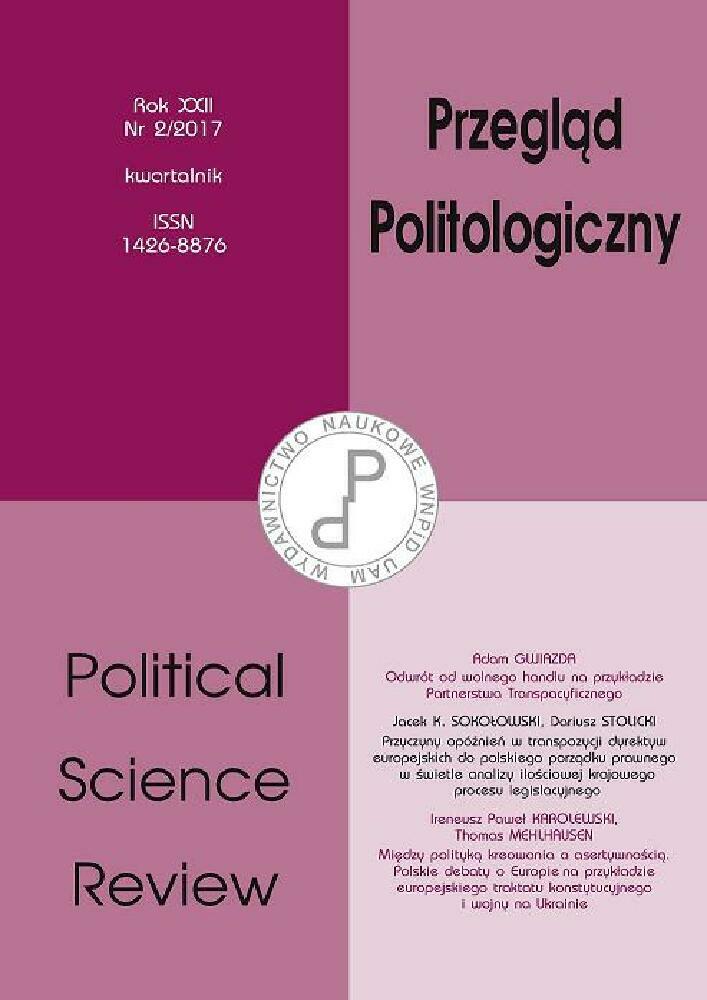Abstrakt
W niniejszym artykule głównym celem będzie analiza efektów przekształceń modelu funkcjonowania MFW, zapoczątkowanych w 2006 r. w Singapurze, realizowanych w głównej mierze od 2010 roku i określanych jako najbardziej fundamentalna reorganizacja zarządzania w 65-letniej historii MFW i największe dotychczasowe przesunięcie wpływów na korzyść rynków wschodzących i państw rozwijających się. Artykuł ten, usytuowany w ramach instytucjonalnego nurtu badań nad globalnym zarządzaniem i wykorzystujący podejście badawcze, które określa się mianem krytycznej międzynarodowej ekonomii politycznej, będzie stanowił próbę odpowiedzi na pytanie czy reforma, polegająca na modyfikacji wielkości partycypacji poszczególnych państw w kapitale zakładowym Funduszu, czyli udziału w tzw. kwocie i wynikających z jej wielkości liczby głosów przypadających na państwa członkowskie, była nią w istocie, czy raczej stanowiła przykład dysfunkcjonalności global economic governance.
Bibliografia
BRICS (2014a), Treaty for the Establishment of a BRICS Contingent Reserve Arrangement, July 15.Fortaleza, Brazil, http://www.brics.utoronto.ca/docs/140715-treaty.html, 10.10.2016.
BRICS (2014b), Agreement on the New Development Bank, July 15, Fortaleza, Brazil, http://www.brics.utoronto.ca/docs/140715-bank.html, 10.10.2016.
Cox R. W., Jacobson H. K. (1973), The Anatomy of Influence: Decision Making in International Organization, Yale University Press, New Heaven.
Cox R. W., Sinclair T. J. (1996), Approaches to World Order, Cambridge University Press, Cambridge.
Działo J. (2012), Dlaczego trudno jest prowadzić „dobrą” politykę fiskalną, „Gospodarka Narodowa”, nr 1–2 (245–246), Rok LXXX/XXI.
Fin24 (2012), BRICS agree to boost IMF war chest, 19.06.2012, http://www.fin24.com/Economy/Brics-agree-to-boost-IMF-war-chest-20120619, 7.09.2016.
Haibin N. (2012), BRICS in Global Governance: A Progressive Force? Dialogue on Globalisation, Friedrich Ebert Stiftung, New York.
IMF (2006), IMF Board of Governors Approves Quota and Related Governance Reforms, September 18, Press Release no. 06/205, http://www.imf.org/external/np/sec/pr/2006/pr06205.htm, 10.10.2016.
IMF (2008), Reform of IMF Quotas and Voice: Responding to Changes in the Global Economy,
IMF Issues Brief, April, Issue 1, https://www.imf.org/external/np/exr/ib/2008/040108.htm, 10.02.2017.
IMF (2010a), IMF Executive Board agrees major overhaul of quotas and governance, Press Release no. 10/418, November 5, http://www.imf.org/en/News/Articles/2015/09/14/01/49/pr10418, 10.02.2017.
IMF (2010b), IMF Quota and Governance Reform – Elements of an Agreement, IMF Policy Paper, October 31, Washington D.C.
IMF (2011a), The IMF’s 2008 Quota and Voice Reforms Take Effect, Press Release March 3, Press Release no. 11/64, March 3, http://www.imf.org/external/np/sec/pr/2011/pr1164.htm#P18_387, 23.04.2017.
IMF (2011b), Quota and Voting Shares Before and After Implementation of Reforms Agreed in 2008 and 2010, Washington D.C., http://www.imf.org/external/np/sec/pr/2011/pdfs/quota_tbl.pdf, 23.04.2017.
IMF (2015), IMF Managing Director Christine Lagarde Welcomes U.S. Congressional Approval of the 2010 Quota and Governance Reforms, Press Relaease, no. 15/573, December 18, Washington D.C., http://www.imf.org/external/np/sec/pr/2015/pr15573.htm, 23.04.2017.
IMF (2016a), Articles of Agreement of the International Monetary Fund, April, Washington DC, 14.02.2017.
IMF (2016b), IMF Quotas, IMF Factsheet 2016, https://www.imf.org/About/Factsheets/Sheets/2016/07/14/12/21/IMF-Quotas?pdf=1, 14.02.2017.
IMF (2016c), World Economic Outlook Database, World Economic and Financial Surveys, April, https://www.imf.org/external/pubs/ft/weo/2016/01/weodata/index.aspx, 14.02.2017.
IMF (2017a), IMF Members’ Quotas and Voting Power, and IMF Board of Governors, 26 April, http://www.imf.org/external/np/sec/memdir/members.aspx, 26.04.2017.
IMF (2017b), Acceptances of the Proposed Amendment of the Articles of Agreement on Reform of the Executive Board and Consents to 2010 Quota Increase, 24 April, http://www.imf.org/external/np/sec/misc/consents.htm, 26.04.2017.
IMF (2017c), GDP based on PPP, share of world, World Economic Outlook, April 2017, IMF Data Mapper, http://www.imf.org/external/datamapper/PPPSH@WEO/OEMDC/ADVEC/WEOWORLD/WEQ, 26.04.2017.
Kahn J. (2000), I.M.F. Directors Fail to Rally Around Any New Leader in Poll, „The New York Times”, 3.03.2000, http://www.nytimes.com/2000/03/03/business/imf-directors-fail-to-rally-aroundany-
new-leader-in-poll.html, 2.03.2017.
Keohane R. O. (1984), After Hegemony: Cooperation and Discord in the World Political Economy, Princeton University Press, New York.
Larionova M., Shelepov A. (2015), Is BRICS Institutionalization Enhancing Its Effectiveness?, w: The European Union and The BRICS. Complex Relations in the Era of Global Governance, red. M. Rewizorski, Springer, Heidelberg–New York.
Lukov V. (2012), A Global Forum for the New Generation: The Role of the BRICS and the Prospects for the Future, http://www.brics.utoronto.ca/analysis/Lukov-Global-Forum.html, 20.10.2016.
Menkes M. (2010), IMF’s Governance Reform in the Shadow of Current-accounts Balance Debate, PISM, Bulletin, no. 131 (207).
MercoPress (2009), South American leaders sign agreement creating South Bank, 27 September 2009, http://en.mercopress.com/2009/09/27/south-american-leaders-sign-agreement-creating-southbankBrazilian, 23.10.2016
Peterson, S. V. (2003), A Critical Re-Writing of Global Political Economy: Integrating reproductive, productive and virtual economies, Routledge, London.
Rewizorski M. (2015), Participation of the European Union and the BRICS in the G-20, w: The European Union and The BRICS. Complex Relations in the Era of Global Governance, red. M. Rewizorski, Springer, Heidelberg–New York.
Sinclair T. J. (2012), Global Governance, Polity Press, Cambridge.
Strange S. (1970), International Relations and International Economics: A Case of Mutual Neglect, „International Affairs”, vol. 46, no. 2.
Weisbrot M., Ray R., Johnston J., Cordero J. A., Montecino J. A. (2009), IMF – Supported Macroeconomic Policies and the World Recession: A Look at Forty-One Borrowing Countries, Center for Economic and Policy Research, Washington, DC, http://cepr.net/publications/reports/imfsupported-macroeconomic-policies-and-the-world-recession, 2.03.2017.
Woods N. (2010), Global Governance after the Financial Crisis: A New Multilateralism or the Last Gasp of the Great Powers?, „Global Policy”, vol. 1, issue 1.
Wróblewski M. (2016), Międzynarodowy Fundusz Walutowy w systemie globalnego zarządzania – ewolucja modelu działania?, w: Globalne zarządzanie i jego aktorzy. W poszukiwaniu rozwiązań dla zmieniającego się świata, red. M. Rewizorski, Elipsa, Warszawa.
Xing L. (2014), Introduction. Understanding the Hegemony and the Dialectics of the Emerging World Order, w: The BRICS and Beyond. The International Political Economy of Emergence of a New World Order, red. Li Xing, Ashgate, Farnham.
